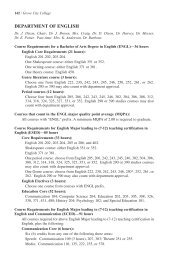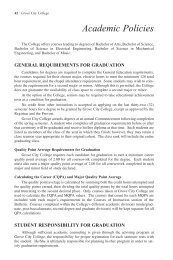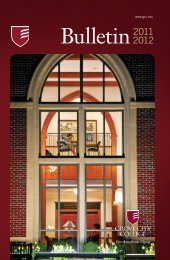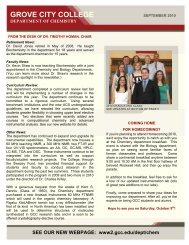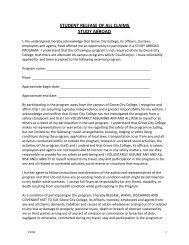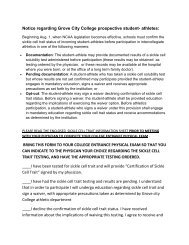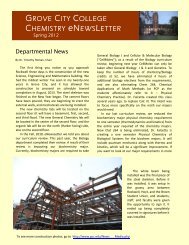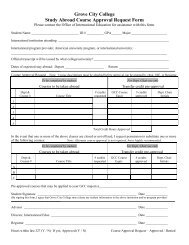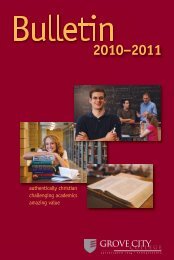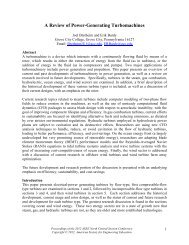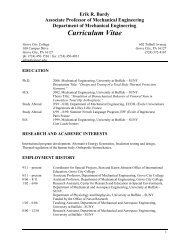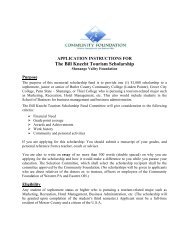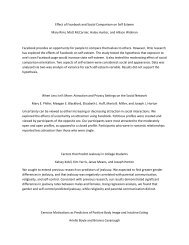2009–2010 - Grove City College
2009–2010 - Grove City College
2009–2010 - Grove City College
Create successful ePaper yourself
Turn your PDF publications into a flip-book with our unique Google optimized e-Paper software.
Sociology / 211<br />
SOCI 209. PRINCIPLES OF SOCIAL WORK. An introduction to the social work profession and<br />
to the social welfare field, including historical development, theory, ethics/values, policy, and key<br />
aspects of and specialization in practice. Biblical views of, and calling to, the field will be considered.<br />
The course will also take a balanced look at private and public, secular and religious, settings and<br />
approaches; as well as considering the growing social entrepreneurship movement.<br />
Alternate Fall semesters, three hours.<br />
SOCI 241. MEDICAL ANTHROPOLOGY. A study of the social and cultural aspects of medicine<br />
and health, strongly emphasizing the results of cross-cultural and comparative research. Topics include<br />
health professionals and services around the world, alternative healers, the demography of health and<br />
illness, and privatized versus government-sponsored health care systems.<br />
Alternate Spring semesters, three hours.<br />
SOCI 251. COURTSHIP AND MARRIAGE. A general introduction to marriage and the family<br />
emphasizing practical living. Topics include dating, courtship, engagement, marriage, romantic love,<br />
and marital adjustment including the roles experienced through life - parenthood and child rearing and<br />
divorce. Semester course, three hours.<br />
SOCI 260. INDEPENDENT STUDY. Individual study of specialized topics in Sociology.<br />
Sophomore standing and permission of the department chair and a faculty sponsor are required.<br />
Semester course, one, two or three hours.<br />
SOCI 270. INDEPENDENT RESEARCH. An opportunity to conduct supervised research in<br />
Sociology. Sophomore standing and permission of the department chair and a faculty sponsor are<br />
required. Semester course, one, two or three hours.<br />
SOCI 277. SOCIAL RESEARCH METHODS. Research methods in the major phases of sociology<br />
investigation: the logic of research, its design and analysis, and specific methods of data collection.<br />
Includes training in locating, assessing, importing, modifying and analyzing secondary data; general<br />
knowledge of key sociological information sources; basic MicroCase and SPSS statistical software<br />
training; and hands-on instruction in all stages of writing professional research reports. This course<br />
fulfills the discipline-specific Writing Intensive (WI) and Information Literacy (IL) requirements for<br />
Sociology majors. Three lectures and two lab hours per week. Prerequisite: Six hours of sociology<br />
including Sociology 101. Fall semester only, four hours.<br />
SOCI 308. SOCIOLOGY OF RELIGION. This course will examine religion from a sociological<br />
perspective, including such topics as sociological theories about religion, how religion affects individuals<br />
and societies, secularization and worldwide religious resurgence, effects of globalization upon<br />
religion, America’s contemporary religious climate, contemporary American Evangelicalism, and the<br />
future of religion. Prerequisite: Sociology 101. Alternate Fall semesters, three hours.<br />
SOCI 312. THE FAMILY AS A SOCIAL INSTITUTION. A course that focuses upon the status,<br />
development, and future of the modern American family from historical, cross-cultural, and sociological<br />
perspectives. Examines contemporary debates over legal definitions of “family,” patterns of family<br />
structure, families and the elderly, family policy, and reviews non-governmental approaches to<br />
strengthening the family. Recommended for those students contemplating careers in teaching, the<br />
helping professions, ministry, public policy, and research. Alternate Spring semesters, three hours.<br />
SOCI 314. CRIME AND DELINQUENCY. A study of crime and juvenile delinquency in contemporary<br />
society. Basic factors in crime, detection, punishment, delinquency, gangs, courts, probation,<br />
and the science of criminology are studied. Prerequisite: Sociology 101 or 201.<br />
Alternate Spring semesters, three hours.<br />
SOCI 321. SOCIAL CHANGE. An analysis of patterns, mechanisms and strategies of past and<br />
future social change in a rapidly changing world. Social and political movement theory, revolutions,<br />
the force of religion in social movement activism, and recent changes in American society are considered.<br />
Prerequisite: Sociology 101. Alternate Spring semesters, three hours.



